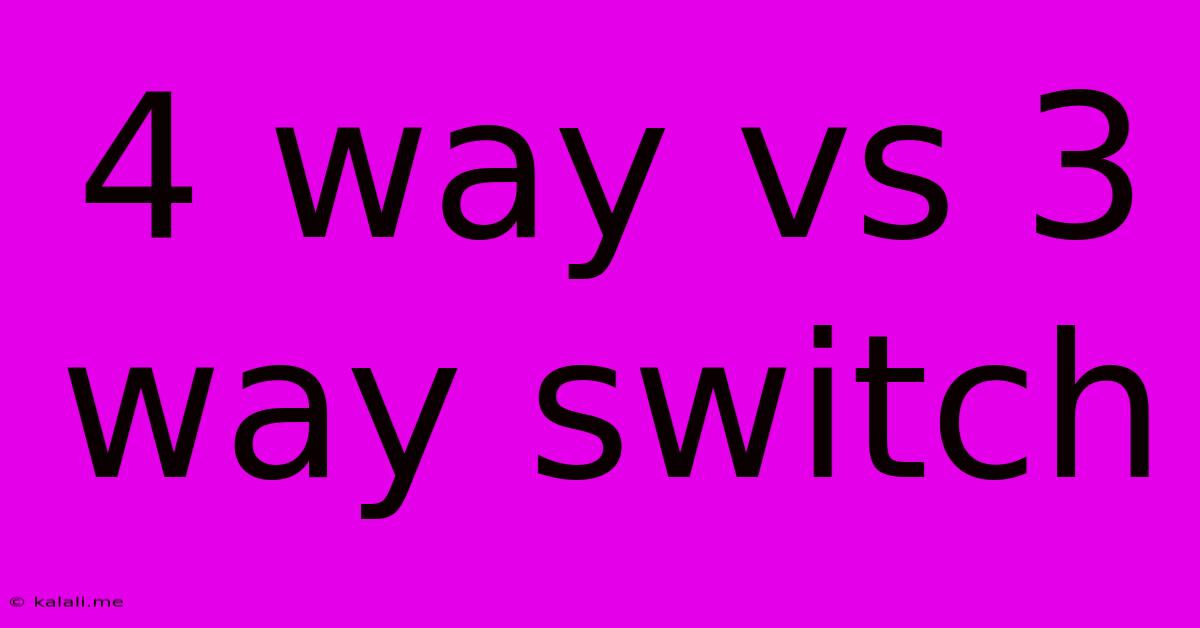4 Way Vs 3 Way Switch
Kalali
Jun 05, 2025 · 3 min read

Table of Contents
4-Way vs 3-Way Switches: Understanding the Differences and Applications
Choosing between a 3-way and a 4-way switch can be confusing for many homeowners tackling electrical projects. This article clarifies the distinctions, helping you determine which switch is right for your lighting needs. Understanding the differences between these switches will ensure you have the correct setup for controlling lights from multiple locations.
What is a 3-Way Switch?
A 3-way switch allows you to control a light fixture from two different locations. This is incredibly useful for staircases, hallways, or any area with entry points at opposite ends. Imagine controlling your hallway light from both the top and bottom of the stairs – that's the power of a 3-way switch setup. It uses a specific wiring configuration involving common and traveler wires to achieve this control. You'll see three terminals on a 3-way switch: two travelers and a common.
Key features of a 3-way switch:
- Controls a light from two locations.
- Requires a pair of 3-way switches.
- Uses common and traveler wires.
- Simplifies lighting control in multi-access areas.
What is a 4-Way Switch?
A 4-way switch expands the control possibilities beyond two locations. It's used in conjunction with 3-way switches to allow light control from three or more places. Think of a long corridor with light switches at three different points – this is where a 4-way switch comes into play. It acts as an intermediary, allowing you to switch the circuit on or off from each location. It has four terminals, allowing for the signal to be passed along the circuit.
Key features of a 4-way switch:
- Extends light control beyond two locations.
- Always used in combination with at least two 3-way switches.
- Enables multi-point control of lighting circuits.
- Provides flexibility for complex lighting configurations.
Key Differences Between 3-Way and 4-Way Switches
The core difference lies in the number of locations they can control lights from and their role within a larger switching system.
| Feature | 3-Way Switch | 4-Way Switch |
|---|---|---|
| Number of Locations | Two | Three or more (part of a system) |
| Wiring | Common and Traveler wires | Four terminals (intermediary) |
| Application | Controlling lights from two points | Extending control to multiple points |
| Usage in System | Essential component | Part of a larger multi-location system |
Choosing the Right Switch for Your Needs
Determining which switch you need depends entirely on the number of locations you want to control your lights from. If you only need to control a light from two separate points, a pair of 3-way switches is all you need. If you need to control a light from three or more locations, you'll need at least two 3-way switches and one or more 4-way switches. The 4-way switch acts as the intermediary, passing the signal between the 3-way switches in the circuit. Incorrectly choosing switches can result in a non-functional lighting system. Always consult a qualified electrician if you are unsure about your wiring configuration.
Troubleshooting and Safety
Electrical work can be dangerous. If you're not comfortable working with electricity, it's crucial to hire a qualified electrician. Improper wiring can lead to electrical hazards and damage to your home. Always turn off the power at the breaker box before working with any electrical components. Safety should always be the top priority in any electrical project.
This comprehensive guide helps clarify the distinctions between 3-way and 4-way switches, enabling you to make informed choices for your home improvement projects. Remember, safety first!
Latest Posts
Latest Posts
-
Car Wont Start One Click Then Nothing
Jun 07, 2025
-
Him Domt Know Where Him Is
Jun 07, 2025
-
Get Your First Image In Knowledge Panel
Jun 07, 2025
-
Has Jennifer Aniston Ever Gone Nude
Jun 07, 2025
-
Who Was On The Cross With Jesus
Jun 07, 2025
Related Post
Thank you for visiting our website which covers about 4 Way Vs 3 Way Switch . We hope the information provided has been useful to you. Feel free to contact us if you have any questions or need further assistance. See you next time and don't miss to bookmark.